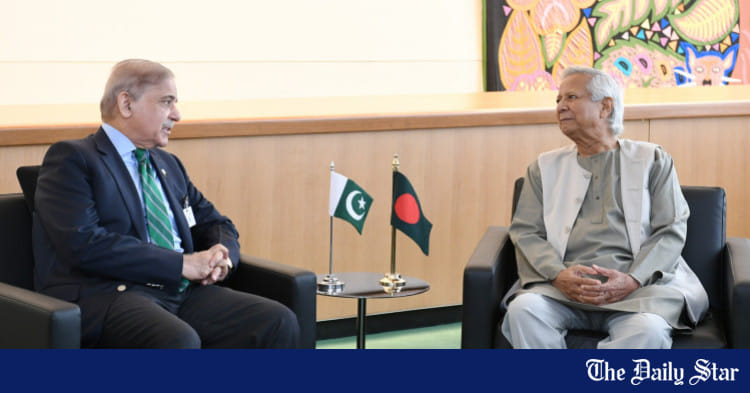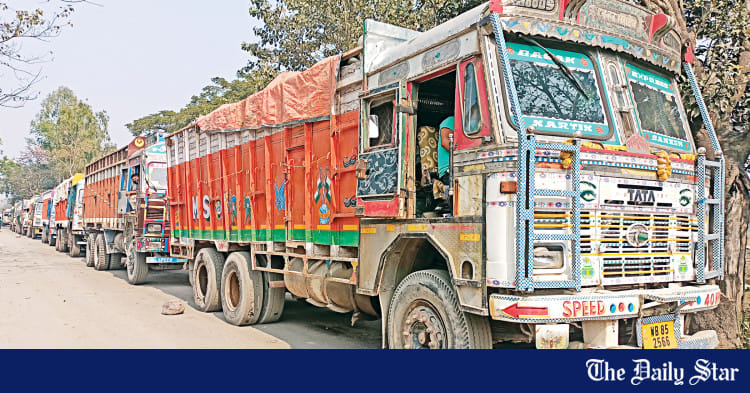Saif
Senior Member
- Joined
- Jan 24, 2024
- Messages
- 17,262
- Likes
- 8,334
- Nation

- Residence

- Axis Group

Pak PM for reinvigorating SAARC process
Bangladesh Sangbad Sangstha . Dhaka 30 August, 2024, 16:33

Left, Bangladesh chief adviser professor Muhammad Yunus, and, right, Pakistan prime minister Muhammad Shehbaz Sharif. | BSS photo
Pakistan prime minister Muhammad Shehbaz Sharif called chief adviser professor Muhammad Yunus over telephone on Friday, congratulating him on his assumption of the leadership of the interim government of Bangladesh.
The Pakistan PM expressed his best wishes to the chief adviser and hoped that the goodwill between the two South Asian countries would be translated into substantial cooperation for the benefit of their peoples.
Professor Yunus thanked Shehbaz Sharif for the phone call and the congratulatory message received from him following his swearing-in as the Bangladesh chief adviser after a student-led revolution, the chief adviser’s press wing said.
He also thanked Shehbaz Sharif for sending a message conveying sympathy and solidarity of the people of Pakistan for the flood victims of Bangladesh.
Shehbaz expressed his willingness to provide support for the people affected by the floods in southern and south-eastern parts of Bangladesh.
He emphasised the need to revitalise relations between the two nations, saying that there remained immense potential in expanding bilateral trade and economic cooperation.
The Pakistan PM underscored the necessity to resume mechanisms like foreign secretary-level consultations and the joint economic commission between Dhaka and Islamabad.
He also stressed the need for reinvigorating the SAARC process.
The chief adviser said that he was committed to revitalising SAARC as a top regional forum to boost ties among the South Asian nations.
He highlighted the necessity of holding regular SAARC summits and stressed holding even a brief meeting among the heads of state and governments of the SAARC states at the earliest convenience.
Professor Yunus also called for strengthening economic ties and people-to-people connections between the two nations.
Bangladesh Sangbad Sangstha . Dhaka 30 August, 2024, 16:33
Left, Bangladesh chief adviser professor Muhammad Yunus, and, right, Pakistan prime minister Muhammad Shehbaz Sharif. | BSS photo
Pakistan prime minister Muhammad Shehbaz Sharif called chief adviser professor Muhammad Yunus over telephone on Friday, congratulating him on his assumption of the leadership of the interim government of Bangladesh.
The Pakistan PM expressed his best wishes to the chief adviser and hoped that the goodwill between the two South Asian countries would be translated into substantial cooperation for the benefit of their peoples.
Professor Yunus thanked Shehbaz Sharif for the phone call and the congratulatory message received from him following his swearing-in as the Bangladesh chief adviser after a student-led revolution, the chief adviser’s press wing said.
He also thanked Shehbaz Sharif for sending a message conveying sympathy and solidarity of the people of Pakistan for the flood victims of Bangladesh.
Shehbaz expressed his willingness to provide support for the people affected by the floods in southern and south-eastern parts of Bangladesh.
He emphasised the need to revitalise relations between the two nations, saying that there remained immense potential in expanding bilateral trade and economic cooperation.
The Pakistan PM underscored the necessity to resume mechanisms like foreign secretary-level consultations and the joint economic commission between Dhaka and Islamabad.
He also stressed the need for reinvigorating the SAARC process.
The chief adviser said that he was committed to revitalising SAARC as a top regional forum to boost ties among the South Asian nations.
He highlighted the necessity of holding regular SAARC summits and stressed holding even a brief meeting among the heads of state and governments of the SAARC states at the earliest convenience.
Professor Yunus also called for strengthening economic ties and people-to-people connections between the two nations.








































